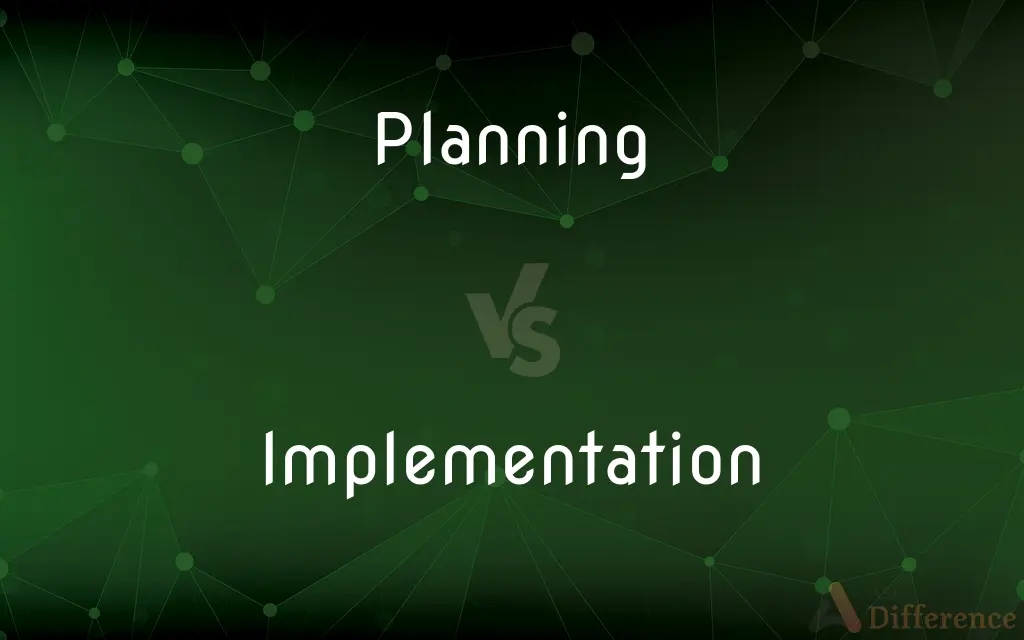Planning vs. Implementation — What's the Difference?
By Maham Liaqat & Fiza Rafique — Updated on March 11, 2024
Planning involves setting objectives and deciding how to achieve them; implementation is the process of executing the plan. Planning is theoretical, focusing on strategies, while implementation is practical, executing those strategies.

Difference Between Planning and Implementation
Table of Contents
ADVERTISEMENT
Key Differences
Planning is the first step in any project or strategy, involving the formulation of objectives and the methods to achieve them. It requires setting goals, determining actions to achieve the goals, and mobilizing resources to execute the actions. On the other hand, implementation is the stage where plans are put into action. It involves executing the strategies and methods devised during the planning phase, often requiring adjustments and problem-solving to address real-world challenges.
In planning, decision-makers identify potential opportunities and threats, analyze their implications, and develop strategies to navigate them. This phase is characterized by research, analysis, and strategic thinking. Whereas, during implementation, the focus shifts to operationalization, requiring coordination, resource allocation, and often, direct action to execute the planned strategies effectively.
Planning typically occurs in a more controlled environment, allowing for thorough consideration and revision of strategies without the immediate pressure of tangible results. In contrast, implementation happens in a dynamic environment where unpredictability and external factors can significantly impact the execution of plans, necessitating flexibility and adaptability.
The success of planning is measured by the quality and feasibility of the strategies devised. It’s about creating a roadmap that guides the organization towards its goals. On the other hand, the success of implementation is measured by the achievement of the objectives laid out in the plan, requiring efficient execution and effective problem-solving capabilities.
Planning is often a collaborative process involving input from various stakeholders to ensure a comprehensive strategy that addresses all aspects of the goal. Implementation, while also requiring collaboration, leans more on the leadership and management teams to motivate, direct, and oversee the execution process, ensuring that the plan’s objectives are met.
ADVERTISEMENT
Comparison Chart
Definition
The process of setting goals and deciding how to achieve them.
The process of executing the plans and strategies.
Focus
Theoretical, involving strategy and resource allocation planning.
Practical, involving the actual execution of plans.
Environment
Controlled, allowing for thorough consideration and revision.
Dynamic, often impacted by unpredictability and external factors.
Measurement of Success
Quality and feasibility of strategies.
Achievement of objectives and effective problem-solving.
Primary Actors
Decision-makers, strategists.
Leadership, management, operational teams.
Compare with Definitions
Planning
The act of formulating a course of action.
The team's planning session focused on increasing market share.
Implementation
The action of putting something into effect.
The implementation of the new policy starts next Monday.
Planning
The organization of tasks and resources.
Good planning can significantly reduce the time needed to complete a project.
Implementation
The practical application of a plan or method.
The team was responsible for the smooth implementation of the marketing strategy.
Planning
The process of setting objectives and determining how to accomplish them.
Effective planning is crucial for the success of any project.
Implementation
The process of executing plans and strategies.
Successful implementation requires careful monitoring and adjustments.
Planning
A preparatory step for action.
The planning phase ensured all resources were aligned for the project's success.
Implementation
The realization of an application, or execution of a plan.
The software's implementation was completed ahead of schedule.
Planning
The development of strategies to achieve goals.
Planning involves analyzing strengths, weaknesses, opportunities, and threats.
Implementation
The act of bringing plans to fruition.
Implementation is often where theory meets practice.
Planning
A proposed or intended course of action
Had no plans for the evening.
Implementation
Implementation is the realization of an application, or execution of a plan, idea, model, design, specification, standard, algorithm, or policy.
Planning
Planning is the process of thinking about the activities required to achieve a desired goal. It is the first and foremost activity to achieve desired results.
Implementation
The process of putting a decision or plan into effect; execution
She was responsible for the implementation of the plan
Planning
The process of making plans for something
The planning stages of the operation
Mass production methods call for detailed planning
Implementation
A tool, utensil, or other piece of equipment used in doing work
A gardening implement.
Planning
An orderly or step-by-step conception or proposal for accomplishing an objective
A plan for improving math instruction.
Implementation
An article used to outfit or equip someone
Ecclesiastical implements.
Planning
A systematic arrangement of elements or important parts; a configuration or outline
A seating plan.
The plan of a story.
Implementation
A means of achieving an end; an instrument or agent.
Planning
A drawing or diagram made to scale showing the structure or arrangement of something.
Implementation
To put into practical effect; carry out
Implement the new procedures.
Planning
In perspective rendering, one of several imaginary planes perpendicular to the line of vision between the viewer and the object being depicted.
Implementation
To supply with implements.
Planning
A program or policy stipulating a service or benefit
A pension plan.
Implementation
The process of moving an idea from concept to reality. In business, engineering and other fields, implementation refers to the building process rather than the design process.
Now that the requirements are complete we can move on to implementation.
Planning
To formulate a scheme or program for the accomplishment, enactment, or attainment of
Plan a campaign.
Implementation
(electronics) A result of implementing something; a finished product, system or device.
His implementation works, but it needs some fine-tuning.
Planning
To have as a specific aim or purpose; intend
They plan to buy a house.
Implementation
The act of accomplishing some aim or executing some order;
The agency was created for the implementation of the policy
Planning
To draw or make a graphic representation of.
Implementation
The act of implementing (providing a practical means for accomplishing something); carrying into effect
Planning
To make plans.
Planning
Present participle of plan
Planning
(uncountable) Action of the verb to plan.
Planning
The act of formulating of a course of action, or of drawing up plans.
Planning
The act of making contingency plans.
Planning
Planning permission.
My neighbours were going to build an extension but they didn't get planning.
Planning
An act of formulating a program for a definite course of action;
The planning was more fun than the trip itself
Planning
The act or process of drawing up plans or layouts for some project or enterprise
Planning
The cognitive process of thinking about what you will do in the event of something happening;
His planning for retirement was hindered by several uncertainties
Common Curiosities
What is implementation?
Implementation is the phase where plans and strategies are executed or put into action.
What is planning?
Planning is the process of setting goals, developing strategies, and deciding on the actions and resources needed to achieve those goals.
Are planning and implementation linear processes?
While traditionally viewed as linear, in practice, planning and implementation often involve iterative cycles of planning, acting, evaluating, and revising.
Why is planning important?
Planning is important because it provides a roadmap for achieving objectives and helps to organize resources and efforts effectively.
How can one ensure effective implementation?
Effective implementation requires clear communication, resource allocation, and the ability to adapt to challenges and make necessary adjustments.
Why is implementation crucial?
Implementation is crucial because, without it, plans remain theoretical and goals are not achieved.
What skills are important for planning?
Analytical thinking, strategic foresight, and organizational skills are crucial for effective planning.
How does planning differ from implementation?
Planning is the theoretical aspect of preparing and strategizing, while implementation is the practical aspect of executing those plans.
Can planning and implementation occur simultaneously?
While planning usually precedes implementation, in dynamic environments, some level of simultaneous planning and implementation may be necessary for flexibility and adaptability.
What skills are important for implementation?
Leadership, problem-solving, and project management skills are key for successful implementation.
What is the relationship between planning and success?
A well-conceived plan increases the likelihood of success, while effective implementation is what ultimately brings success.
Can a plan be changed during implementation?
Yes, plans often need to be adjusted during implementation in response to unforeseen challenges or opportunities.
What role does feedback play in planning and implementation?
Feedback is essential in both phases for assessing the effectiveness of strategies and actions, and for making adjustments to improve outcomes.
How do external factors affect planning and implementation?
External factors can significantly impact both phases, necessitating flexibility in planning and adaptability in implementation.
How do timeframes differ between planning and implementation?
Planning is generally confined to a specific preparatory period, while implementation timeframes are determined by the complexity and scope of the plan.
Share Your Discovery

Previous Comparison
Notebook vs. Handbook
Next Comparison
Owl vs. ParrotAuthor Spotlight
Written by
Maham LiaqatCo-written by
Fiza RafiqueFiza Rafique is a skilled content writer at AskDifference.com, where she meticulously refines and enhances written pieces. Drawing from her vast editorial expertise, Fiza ensures clarity, accuracy, and precision in every article. Passionate about language, she continually seeks to elevate the quality of content for readers worldwide.
















































